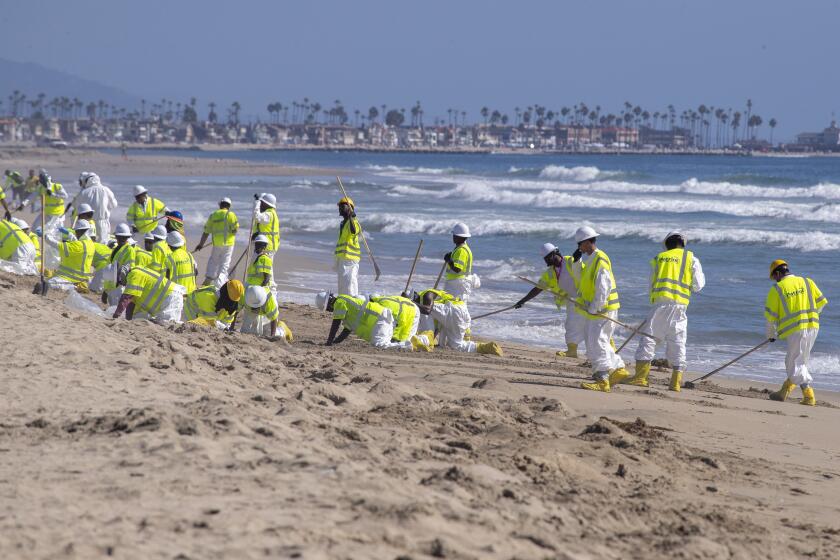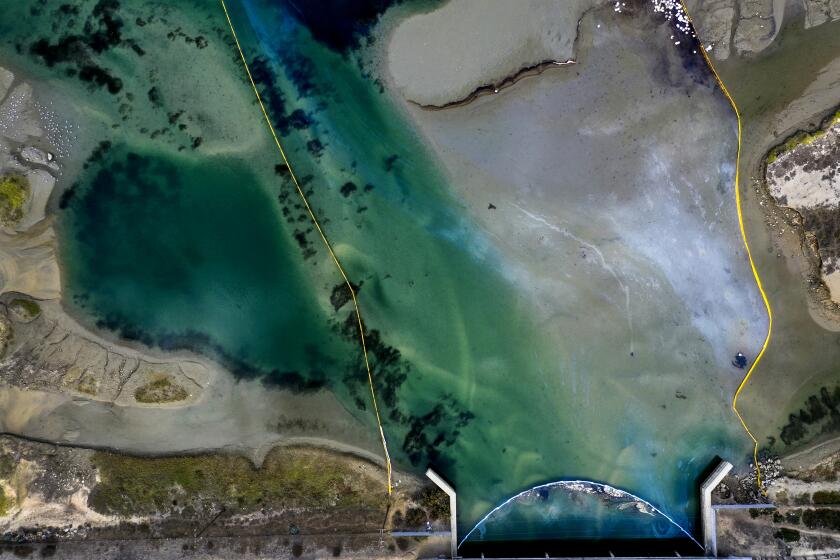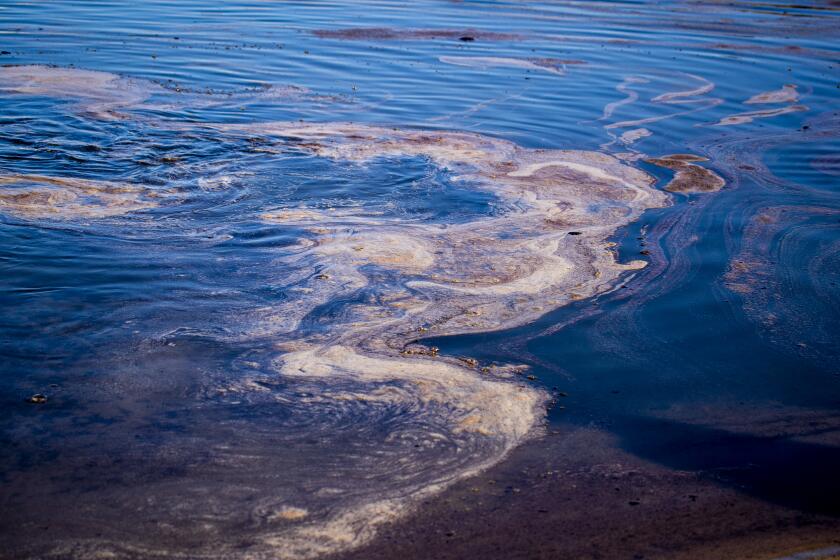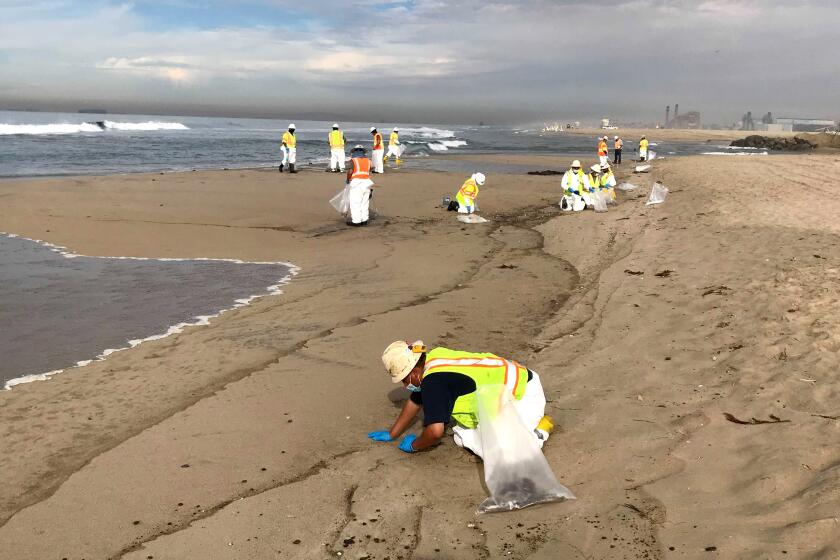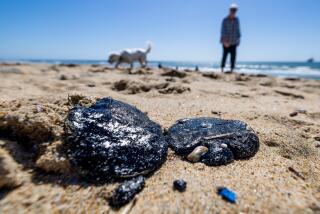Orange County oil spill: First federal lawsuit filed as residents take stock of losses
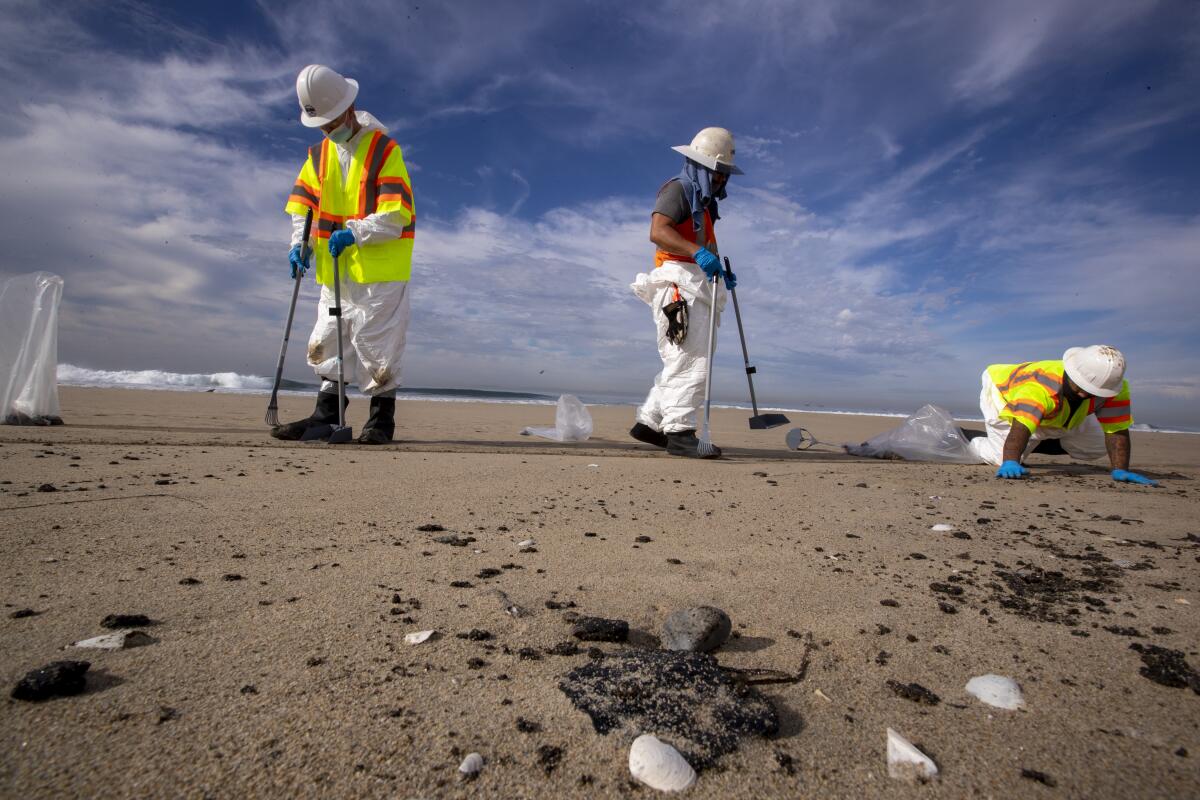
The list of those affected by the disastrous oil spill off the coast of Orange County is growing as residents of Huntington Beach and nearby seaside communities take stock of the damage.
Already, one resident has filed a federal class-action lawsuit alleging lost wages and the potential exposure to health hazards. Another staged a small protest, citing additional economic hardships after more than a year of pandemic-related uncertainty. A third, a lobster fisherman, said he expected significant losses during what is typically his busiest time of the year.
Huntington Beach Mayor Kim Carr said the area’s famed beaches could be closed for weeks or even months. But with oil-slicked seabirds, empty businesses and shuttered fisheries, some fear the sticky black crude along the coastline will mar the Surf City lifestyle for far longer.
“We’re getting to the point where we’re having all these stressors upon stressors upon stressors,” said Sean Anderson, chair of the Environmental Science and Resource Management Program at CSU Channel Islands. “What is the additional stress of this oil spill on already stressed systems?”
A massive oil spill off the Orange County coast has fouled beaches and killed birds and marine life
Anderson, who has researched oil spills in California, Louisiana and the Middle East, said the Orange County spill is not an isolated disaster but “yet another injury” to an ecosystem, to an economy, to life as we’ve known it.
“An analogy is COVID-19,” he said. “The most significant impact might not be on ecology. It might be socioeconomic.”
The first federal lawsuit linked to the disaster was filed in Los Angeles late Monday against Amplify Energy Corp. and its Beta Offshore division. The Houston-based energy company owns the oil production facility from which the 144,000-gallon spill appears to have originated.
The suit was brought on behalf of Huntington Beach resident Peter Moses Gutierrez Jr., who owns a DJ company that performs frequent events on the beachfront, according to court documents.
The complaint alleges that Gutierrez has lost, and will continue to lose, a substantial amount of business due to the oil spill. Amplify Energy did not immediately respond to requests for comment.
The complaint also alleges that Gutierrez and other local residents were exposed to dangerous toxics due to the spill, citing Orange County health officer Clayton Chau’s advisory about direct and indirect health affects of oil. The advisory recommended that residents who encountered the oil seek medical attention and warned that contaminants from the spill could be absorbed through the skin or inhaled through aerosolized vapors.
“After the breach occurred and oil began to seep into the Pacific Ocean, the surrounding areas became affected and the citizens who live in those areas were affected as well,” the suit says.
Residents were also asked to refrain from participating in recreational activities on the coastline, such as swimming, surfing, biking, walking, exercising and gathering.
“It’s a huge environmental impact,” Orange County Supervisor Katrina Foley said while surveying the damage on Sunday, “and it’s an economic impact both in terms of the cleanup and shutting down a major tourist destination during a pandemic when we’ve all been struggling.”
Officials first learned Friday night an oil slick was likely, but it wasn’t until the following evening that the public was told how serious it was.
Gutierrez is one of several business owners reporting losses. The state Department of Fish and Wildlife has placed a temporary ban on commercial and recreational fishing in an area that stretches about 20 miles from Sunset Beach south to Dana Point and extends six miles out to sea.
Josh Hernandez, 29, is a commercial fisherman who harvests lobster off the coast of Orange County. On the first Wednesday of October, he and others with permits can legally trap the crustaceans.
The first two weeks “is when we catch the most,” he said, noting that they make about 70% of their profit in the early part of the season. Last year in October, Hernandez sold about $80,000 worth of lobster.
He had heard about the oil spill through Instagram and watched as it inched closer and closer to Laguna Beach, where he had set a fourth of his 300 traps.
He spent all day moving those traps to Dana Point and chopping bait before learning everything was closed as far as San Clemente Pier. Authorities were also planning to set up a boom at the harbor mouth, preventing boats from leaving and coming back.
“It’s going to have a huge impact,” he said. “It’s really catastrophic.”
He worried about the several hundred traps left at Dana Point, each worth $100, that could be damaged by the oil.
“I wait for this all summer long,” he said. “I have credit cards racked up, bills to pay and a 2-year-old daughter and one more on the way. I just don’t know what to do at this point.”
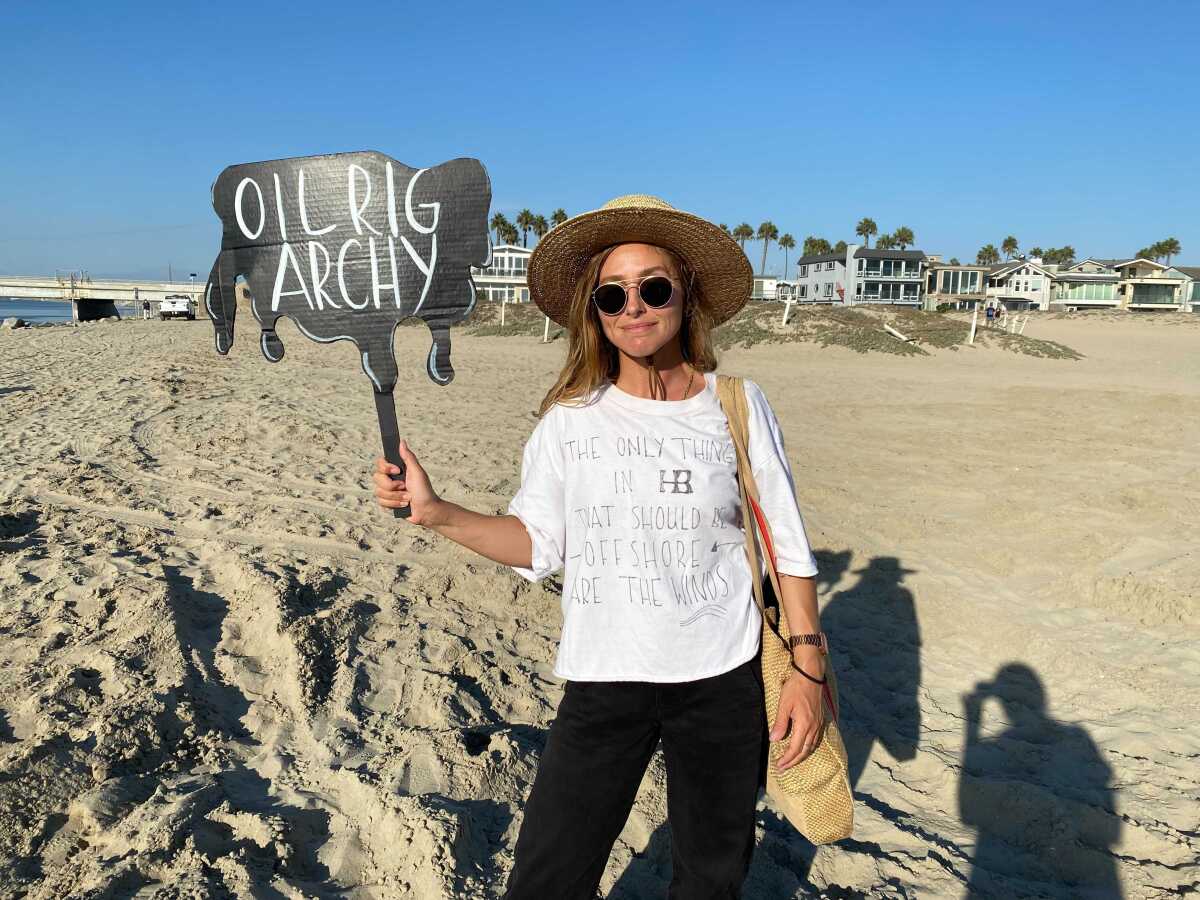
Surf coach Bronwyn Major said her business has also taken a hit from the oil spill.
On Sunday afternoon, Major walked on the beach holding a two-sided sign that read “No / oilrigarchy.” Her white shirt read “The only thing in HB that should be offshore are the winds.”
The spill forced Major to cancel her women’s surf club, which she hosts every Sunday for up to half a dozen clients in Huntington Beach. She’s been hosting the club for about a year.
“This isn’t going to be cleaned up by tomorrow. It’s going to take at least a couple of weeks, maybe even a couple of months before we stop seeing some of the tar wash up,” she said. “I’m going to be directly impacted. Obviously I’m going to have to shift some of my work.”
It felt like just the latest blow. Major, who has been coaching for eight years, said the pandemic had already hammered her livelihood. Then came the loss of unemployment benefits, and now the oil spill.
“It’s just one more hit,” she said. “It’s really hard coming out of a pandemic and just trying to get back on your feet again.”
The oil spill had reached the Talbert Marsh and some environmentally sensitive wetlands areas by Sunday morning.
The spill, which garnered a state of emergency declaration from Gov. Gavin Newsom, reached the Talbert Marsh and some environmentally sensitive wetlands on Sunday morning. Some fish and birds have already been found dead, and wildlife protectors fear many more victims in the days ahead.
Unlike potential economic losses, “you can’t really do that kind of quantitative assessment for a wetlands being undermined,” said Deborah Sivas, director of the Environmental Law Clinic at Stanford Law School. “We have so few coastal wetlands left, and they serve a really important ecological role.”
Sivas, who is not involved in any lawsuits related to the Orange County spill, said Amplify could be on the hook for cleanup costs and natural resource damages. Plains All American Pipeline L.P., the company involved in the 2015 Refugio oil spill off the coast of Santa Barbara, agreed to a settlement of about $60 million for similar claims, she said.
There could be merit for some civil claims, she said, noting that a victims fund was set up for people who lost their livelihoods permanently after the Deepwater Horizon Oil Spill in 2010 — although she did not think the the impact in Orange County would be as long-lasting, given the relatively smaller size of the spill.
The offshore waters along the Orange and Los Angeles county coasts are teeming with cargo ships waiting to get into the ports of L.A. and Long Beach.
The cause of the oil spill has not officially been determined, but Amplify has stated that a ship’s anchor striking the pipeline was “one of the distinct possibilities.” Locals have raised questions about how long it took to notify residents of the spill.
The U.S. attorney’s office in Los Angeles said it was “working with other federal law enforcement authorities to determine if there may be any criminal liability resulting from the oil spill,” according to spokesman Thom Mrozek.
Anderson, of Cal State Channel Islands, said his group’s research found a relatively minor economic impact from the 2015 Refugio spill, but noted that so much has been destabilized by the COVID-19 pandemic.
“Now we have all these businesses that can barely keep afloat,” he said. “They can’t afford two months” of disruption.
“There’s an analogy to the ecology world,” he said. “In the human world, assault upon assault upon assault — that’s how we should be thinking about it. Not as a single assault on a pristine world.”
More to Read
Sign up for Essential California
The most important California stories and recommendations in your inbox every morning.
You may occasionally receive promotional content from the Los Angeles Times.
